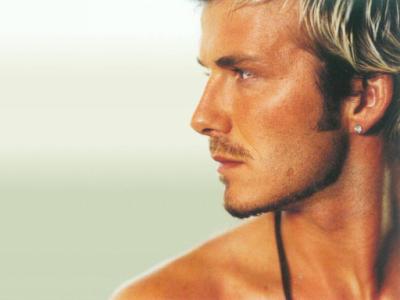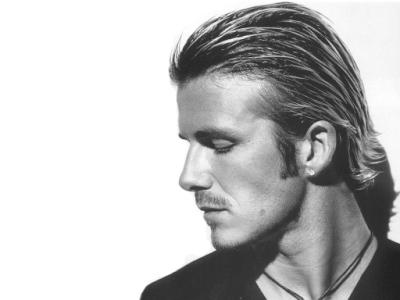On 2 April 1995, David made his League debut at home to Leeds United. His first team debut had come two and a half years earlier when he came on as a substitute, 20 minutes from time, during the away leg of a Rumbelows Cup second round tie at Brighton and Hove Albion on October 1 1992.  It was in United's 1995/96 Double winning season that David established himself in the first team. Playing mainly right midfield (although his preferred position is central midfield) to fill the void left by the departure of Andrei Kanchelskis. It is David's goals which have made him a household name. He scored the winner in the FA Cup semi-final against Chelsea in 1996, a superb free kick in the 1998 World Cup Finals and "that goal" from the halfway line in the first game of the 1996/97 season at Wimbledon. His performances in the 1995/96 season caught the eye of the then England manager Glenn Hoddle, who gave him his full debut on September 1 1996 against Moldova in Kishinev. Prior to this David had been capped at youth and Under-21 level. During the 1996/97 season David came of age, proving to be a permanent fixture in the United and England teams. His match-winning performances for Manchester United during the season were enough to convince his fellow professionals to vote for him in the PFA awards, and he won the Young Player of the Year award, and came second in the Player of the Year voting. In the same year he also helped United to the European Cup semi-final and another Premier League Championship. Some experts predicted that his World Cup problems could lead to his exit from English football, but he knuckled down to prove them all wrong. In the first League game of the season against Leicester, he curled in one of his trademark free-kicks to prevent defeat. In March 1999 he became a father to Brooklyn, whose name appeared on his boots when United completed the unprecedented Treble of Premiership, FA Cup and European Cup. In July 1999, David married Victoria Adams, better known as 'Posh', a member of the Spice Girls pop group. The midfielder picked up his fourth Premiership winner's medal, and was voted second best player in Europe and the World. Rivaldo of Barcelona and Brazil pipped him to both awards. David also finished runner-up in the BBC Sports Personality of the Year, losing out to boxing champion Lennox Lewis. The major highlights of David's 2000/01 season were on the international stage, although he again won the Premiership title with United, having scored in three matches in a row early in the campaign. David proudly captained England for the first time in a friendly in Italy and then kept the armband for the friendly with Spain and the World Cup qualifiers against Albania and Finland, against whom he score  d an important goal at Anfield, home of
Liverpool FC. d an important goal at Anfield, home of
Liverpool FC. David's next challenge will be to lead England in the 2002 World Cup Finals after his goal against Greece in the last minute of the Old Trafford match earned qualification, and help United reclaim their status as Europe's best club. Skilful as ever on the pitch and voted second best player in the world and Europe. Rivaldo beat him for both awards and he had to settle for runner-up spot again when Lennox Lewis was named BBC Sports Personality of the Year. Since then he has been given the England captainís armband by Sven Goran Eriksson, who has brought the best international performances yet out of the player - not least his injury time free-kick against Greece which qualified England for the World Cup finals. More recently he made the headlines again when he suffered a broken bone in his left foot. But he recovered in time and if he wasn't always at his best, his presence propelled England to the quarter-finals. Back to top |